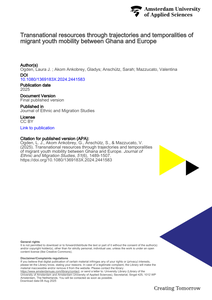This study presents an application of the contingent valuation method for valuing medal winning success on a transnational basis to test whether more medals won equates to more utility. To achieve this aim, a research project was set up in five countries: Belgium, Finland, Japan, the Netherlands, and the United Kingdom. Respondents were asked to state their willingness to pay to avoid a large-scale reduction in government funding for elite sport, resulting in a 50% reduction in medals won at the Tokyo 2020 Olympics. Results show that willingness to pay for avoiding reduced medal winning performance differs significantly between countries with the more successful countries reporting higher willingness to pay values than the relatively less successful countries. This finding indicates that more medals won appears to be linked with more utility. The validity tests on the regression models were generally consistent with the theoretical expectations. Implications are discussed in terms of how governments can promote elite sport development while being conscious of the public's acceptability of such investment.
DOCUMENT
Research on migrant youth makes two longstanding assumptions: that they are immobile following their own or their parents’ migration and that their resource environments are confined to their country of residence. Recent investigations of transnational youth mobility question both assumptions, showing that migrant youth – including the first and second generations – are highly mobile, and that their mobility has multiple impacts on their lives. This paper seeks to add to this growing literature by conceptualising as ‘transnational resources’ the perspectives, values, knowledge, and skills that migrant youth gain from their mobility between their countries of origin and residence and which become meaningful in various aspects of their multi-local (or what we call transnational) lives. Drawing on ethnographic data with 81 young people who are mobile between Ghana and three European countries (Belgium, Germany, and the Netherlands), we analyse the three main transnational resources we identified – enhanced sense of self, adaptability, and future outlook. Engaging the dual analytical lenses of temporalities and trajectories, we show both how transnational resources are gained through embodied mobility experiences and how they become meaningful in migrant youth’s lives across time and space.
DOCUMENT

In publications addressing literary reflections on Europe, little attention has been paid to emerging cultural networks, the role of EU subsidies, or literary organisations engaging writers in initiatives aimed at contemplating the challenges that the European Union faces. This dissertation aims to explain the role of new initiatives by presenting four recent, transnational literary projects as case studies: the “Literatur Express Europa 2000”; “The European Constitution in Verse”; “Narratives for Europe”; and “The Return of Europe”. The projects were analysed through an examination of three fundamental aspects: the expectations held by the cultural organisations regarding their initiatives; the cultural artefacts resulting from the projects; and the effects of the projects in the public sphere. By selecting literary projects about Europe as case studies, rather than individual authors or texts, this research allows for an interdisciplinary approach that reveals the interaction between EU politics, civil society, cultural networks, and individual authors.
LINK
The main aim of the project is to provide new research in the arts by focusing on the concept of the inter-sensorial as an essential text for the creation of art and culture. It is designed to foreground the role of the sensorium as an underpinning source for many aspects of thought and cultural heritage. This project will blend visual arts with applied arts and traditional local traditions, revealing new light on the artistic facets and customs which are usually overlooked.The extended residencies will promote transnational mobility for emerging artists, facilitating international relationships between different artistic and cultural contexts within the EU. This will promote transnational interconnectivity between artists and cultures, creating a resourceful intercultural fertilisation, endorsing cultural diversity, social inclusion and most of all, further research on the intercultural facets.Through the various side-activities to take place during the mobilities of the artists, the project aims to strengthen and develop diverse audiences by producing the necessary elements for a dialogue, illustrating interpretations of rich layers of tangible and intangible heritage and legacies of European countries related to the tradition of sensorial experiences and how they evolved around traditional customs. Furthermore, it also aims to rethink and project new and innovative ways for documenting, preserving and communicating data to different audiences.
Dit programma, gefinancierd door de Europese Commissie, zal een nieuwe strategie voor ontwerp en adoptie van ICT-competenties ontwikkelen en vertalen naar een curriculum voor beroepsonderwijs en -opleidingen in Europa. Doel is om huidige en toekomstige competentietekorten in de Europese softwaresector aan te pakken

Dit programma, gefinancierd door de Europese Commissie, zal een nieuwe strategie voor ontwerp en adoptie van ICT-competenties ontwikkelen en vertalen naar een curriculum voor beroepsonderwijs en -opleidingen in Europa. Doel is om huidige en toekomstige competentietekorten in de Europese softwaresector aan te pakkenDoel De Europese Software Skills Alliantie (gefinancierd door de Europese Commissie) is een samenwerkingsverband met als doel het ontwerpen, implementeren en verspreiden van een nieuwe strategie voor het opstellen en adopteren van ICT-competenties om huidige en toekomstige competentietekorten in de Europese softwaresector aan te pakken. Resultaten Alle partners werken samen om ervoor te zorgen dat de nieuwe Software Skills-strategie voortkomt uit de vraag van het werkveld naar softwarevaardigheden. Hierbij speelt de combinatie van beroepsonderwijs en -opleiding en werkgebaseerde leerinitiatieven een rol om snelle bijscholing en omscholing te implementeren. De nieuwe strategie en onderwijsoplossing houden rechtstreeks verband met erkende Europese instrumenten, en normen die vaardigheden en loopbaanontwikkeling in het algemeen mogelijk maken. Bovendien zullen nieuwe mechanismen hierin worden opgenomen, voor een duurzame implementatie in de verschillende programmalanden. Looptijd 01 december 2020 - 31 december 2024 Meer nieuws Website ESSA softwareskills.eu Aanmelden ESSA nieuwsbrief LinkedIn groep ESSA Needs Analysis Rapport - Europe’s Most Needed Software Roles and Skills Presentatie Key Findings 2021 Needs Analysis Report Artikel: The Software Skills and Professionals You Need in Your Team Artikel: The Top 4 Skills for Software Professionals Artikel: 2021 Retrospective: The Good, the Bad, and the Merry Artikel: NL Case Studie - Digitale certificaten voor de erkenning van niet formele educatie Blog HU lector Pascal Ravesteijn: Towards an European Software Skills Strategy ESSA highlights Launch event ESSA Case Study Booklet - 12 ideas to tackle the shortage of Software Professionals in Europe Wetenschappelijk issue: Bridge the Gap: ICT Competences and Vocational Education and Training ESSA CommunityESSA heeft de ESSA Software Skills-community opgericht om individuen met elkaar te verbinden die ernaar streven te voldoen aan de bijscholings- en bijscholingsbehoeften van de softwaresector in Europa. De community richt zich op de volgende onderwerpen: software, ontwikkeling van software vaardigheden, lesgeven en leren, training, human resources, technologie en carrières. Aanpak Het project bestaat uit zes werkpakketten. Het lectoraat Procesinnovatie & Informatiesystemen is actief betrokken bij alle werkpakketten en co-lead voor werkpakket vier waarin doormiddel van een pilot het ontworpen curriculum wordt getoetst. Hierbij zijn de belangrijkste resultaten van dit werkpakket: modulaire opleidingsprogramma's om de nieuwe curricula voor beroepsonderwijs en -opleidingen te implementeren, die elk bestaan uit een reeks modules die samen de geformuleerde leerdoelen omvatten; proefprogramma's voor beroepsonderwijs en -opleidingen opzetten en uitvoeren voor verschillende doelgroepen in 7 EU-partnerlanden, de doeltreffendheid meten, feedback verzamelen en de opleidingsprogramma's herhalen en verbeteren; werkplek leren opnemen in de nieuwe opleidingsprogramma's met mogelijkheden om kennis toe te passen in praktische situaties die verband houden met elke rol en waar mogelijk transnationale leerervaring opnemen; een Train-the-Trainer-programma ontwikkelen om de bijscholing van docenten te vergemakkelijken waarbij zij de kennis, het vertrouwen en de hulpmiddelen verkrijgen om de training volgens de hoogste kwaliteitsnormen te geven. Relevantie beroepspraktijk ESSA heeft tot doel een innovatief en uitgebreid onderwijscurriculum te ontwikkelen dat is aangepast aan verschillende rol- en functieprofielen en onderliggende competenties, kennis en vaardigheden van de sector. Stap 1: Een analyse van de markt- en bedrijfsbehoeften worden uitgevoerd om een gefundeerde basis te leggen voor de ontwikkeling en implementatie van zowel de Software Skills Strategie als de onderwijsprogramma's. Een belangrijk element hierbij is het werkplek leren (bv. via stage of learning-on-the-job). Stap 2: In een pilot wordt het nieuw ontwikkelde onderwijsmateriaal getest om daarna een vaste plek te krijgen in het curriculum van zowel hoger onderwijsinstellingen als commerciële trainingsbureaus in Europa. Meer weten? www.softwareskills.eu/ DigitalEurope.org ESSA LinkedIn en Twitter